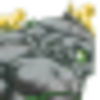That is a good point. My daughter used a puzzle chip to substitute into purples to keep it in play, so did not encounter that problem during that game. I still get it wrong sometimes with when to shift from economy to purples. 
I find Jaina to be the easiest character to play well. Other people have claimed Rook but I am not experienced with Rook. I mostly stuck to Jaina as she is more resilient to red chips (Mix Master/Stolen Purples in particular).
Is your goal to get them up to semi-competitive as soon as possible by giving rote instructions or to teach them the basic concepts they’d need to come up with their own strategies?
Here’s a fuller explanation of what each step of my ‘training programme’ is supposed to teach:

- What the game’s rules are.
- How to use each of the basic resources (
 ,
, ,
, ,
, ,
, ,
,  pile)
pile) - The tradeoff between pile height bonuses and safety
- Given non-black arrows, how to plan turns to play multiple useful chips. Old Valerie doesn’t teach this as well, however.

- What tempo is, and how to control it
- Appropriate use of the three
 s
s - How to end a game
- How to deal with
 s without mirroring them
s without mirroring them

- Reading random banks
- Comboing several different
 s with each other
s with each other - Using
 s to set up combos next turn
s to set up combos next turn - Engine play and endgame tactics
I would say it’s the latter. Basically, I want them to be able to feel like they know what they’re doing.
Valerie is my usual go-to for any beginners - I usually also make the bank replete with various-colored banners so that they can mess about and experiment. I’ve attempted to do so with Grave, but the usefulness of Martial Mastery has oddly proven a bit difficult for those completely new to deckbuilding in general to understand.
Perhaps for that reason, and unlike some of the other repliers, I introduce them to the game usually by playing Gloria, since I can regularly control both our piles easily enough to prolong the game until they get a good grasp on the basics. Feels to me a bit like a cat playing with a mouse at times, but the more attentive of the beginners usually can see what I’m doing after enough repetitions, and begin to understand the importance of thin-decking if the option is available to create a streamlined, efficient deck.
Realizing this is one of my many bad habits. I don’t really play a lot of deckbuilders, Netrunner and Arctic Scavengers are maybe the main plays, so getting my head around the idea of looking past what’s just in my hand is taking some getting used to.
Can you elaborate on what you mean by bad habits? New to the game and also teaching my boardgame group, so would like to not lead them astray…
Ok this makes a little more sense now after our matches. Definitely struggled reading the bank. Will stick with Valerie and Rook for a bit and work on your pointers. Sheesh, feels like I’m back in school! 
Uhhh. That post was more than half a year ago, so I don’t remember, but I’ll take my best guess from context:
The bad habit is “not buying  s and buying
s and buying  s instead.” Because Panda’s Bargain goes to discard when a player buys a purple orb chip, it can make players reluctant to buy combines and crashes when they really need to buy combines and crashes.
s instead.” Because Panda’s Bargain goes to discard when a player buys a purple orb chip, it can make players reluctant to buy combines and crashes when they really need to buy combines and crashes.
lol Thanks for dredging that up, that makes a lot of sense after the teaching games with Bucky…definitely guilty of buying chips that no longer made sense in the context of the current game situation.
Man, this game is a lot deeper than I thought!
No problem. Puzzle Strike is a much deeper game than it appears on the surface. I hope y’all enjoy estimating probabilities 
 ,
, ,
, ,
, ,
, ,
,  pile)
pile) s without mirroring them
s without mirroring them